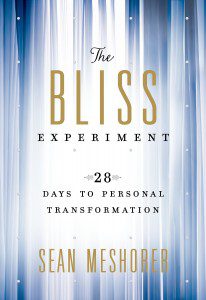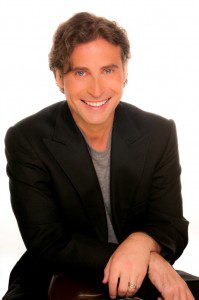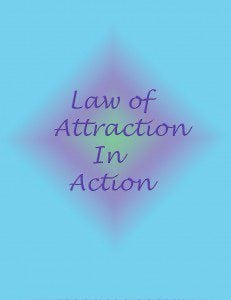 I’m blissful to have Sean Meshorer as my guest today. Sean is an inspirational twenty-first century speaker, teacher, and spiritual coach based in Los Angeles. He graduated from Stanford in 1993 with a degree in Philosophy and Religious Studies and spent fifteen years meditating, studying, practicing, and living at Ananda, the renowned ashram and network of spiritual communities headquartered in Northern California. Sean is now the spiritual director of Ananda Los Angeles. He’s also the author of the new book, The Bliss Experiment, which explains why it’s better to make bliss your goal. Here’s what he has to say.
I’m blissful to have Sean Meshorer as my guest today. Sean is an inspirational twenty-first century speaker, teacher, and spiritual coach based in Los Angeles. He graduated from Stanford in 1993 with a degree in Philosophy and Religious Studies and spent fifteen years meditating, studying, practicing, and living at Ananda, the renowned ashram and network of spiritual communities headquartered in Northern California. Sean is now the spiritual director of Ananda Los Angeles. He’s also the author of the new book, The Bliss Experiment, which explains why it’s better to make bliss your goal. Here’s what he has to say.
We Don’t Really Want to Be Happy
Happiness Isn’t the Goal, Bliss Not Happiness
By Sean Meshorer
What if you don’t really want to be happy?
Most of us spend a good deal of our time pursuing happiness—or at least pleasure. This strikes many of us a perfectly obvious and natural thing to do. From the Declaration of Independence, which announces that it’s our “inalienable right” to “Life, Liberty, and the Pursuit of Happiness” to almost every nook and cranny of pop culture to virtually all contemporary self-help authors, few people appear to challenge the importance of finding happiness.
What if we’re wrong? What if happiness shouldn’t really be our goal? What if happiness by itself isn’t even worthwhile? Though we seldom think about it clearly, the reality is that happiness by itself isn’t at all what we really want, we only think that we do.
Ask yourself this: If I could grant you “happiness” right now but it would come to you with the condition that life itself is meaningless, that there is no purpose in life other than being happy, would you feel satisfied? Or, what if I could grant you “happiness” but told you that you would never have access to any kind of enduring truth? Would, then, happiness still feel like a victory?
The reality is that we don’t just want to be happy. We also want to know if life is meaningful and what our individual and specific purpose is within this framework of meaning. And on top of it all, we want to know that we think, feel, believe, and know corresponds to some kind of enduring truth about ourselves, humanity in general, and even the very Universe itself.
Without all three things: happiness, meaning, and truth, life feels incomplete at best. The good news is that there does exist something that encompasses all three of our life goals: bliss.
Bliss is where happiness, meaning, and truth converge. Everything—and I do mean everything—boils down to our (sometimes subconscious) pursuit of bliss. We pursue money or relationships because we think they’ll make us happy. We pursue our vocation, our hobbies, and our life’s passions because we feel they are deeply meaningful to us. We explore science, religion, and philosophical inquiry because we want to know the truth of our existence. Bliss is the universal place that these intersect, where all questions are answered, where every fulfillment is attained.
Finding bliss isn’t like most other goals we pursue. First and foremost, it’s a wholly internal state. This means that nothing outside of ourselves—and I do mean nothing—affects it or helps us experience it.
No amount of money, luxuries, sex, fame, beauty, or power brings us any closer to finding it. Like so many aspects of life, bliss is not readily apparent to our senses. Because bliss is not an object or a thing, our faculties of sight, hearing, touch, taste, and smell are not designed to detect it. In fact, the more time we spend pursuing these things, the further away from the true happiness of bliss we get.
We have to start by looking within. But even just doing this is no guarantee of finding it. Let’s face it: many of us are messes inside. Our minds are spinning out of control; they’re filled with a cascade of negative thoughts, images, and feelings, none of which would ever be mistaken as blissful. As well, we often spend a good deal of our time reliving the past—usually something negative or traumatic that happened to us—or daydreaming about the future. We are seldom grounded in the Eternal Now.
So even after we make the decision to turn within, we still have some digging to do before we find bliss. We must learn how to live more fully in the present moment and then how to better take control of our own minds, then, using this new-found power, we must learn to slow down that countless stream of thoughts, images, and feelings bombarding us.
Hiding just behind that torrential, out of control, mind of ours,, lies the pure experience of bliss. It’s always here with us, even right now. We just don’t know it because we’re either distracted by looking outside ourselves or because there is too much noise and debris within, masking it, keeping us from seeing the potential hidden within us.
The shift away from focusing on the external state of happiness and toward the internal state of bliss opens new horizons of possibility and potential. It reinforces our essentially spiritual nature while promising lasting solutions to our most fundamental problems. Above all, it’s the only genuine way to experience lasting happiness, find real meaning in our lives, and discover enduring truth.
***************
Take the 31 Days of Self-Love Challenge and get my book, How Do I Love Me? Let Me Count the Ways for free at http://howdoiloveme.com. And you can post your loving acts HERE to reinforce your intention to love yourself. Read my 31 Days of Self-Love Posts HERE.
Please leave comments under my posts so we can stay connected.

